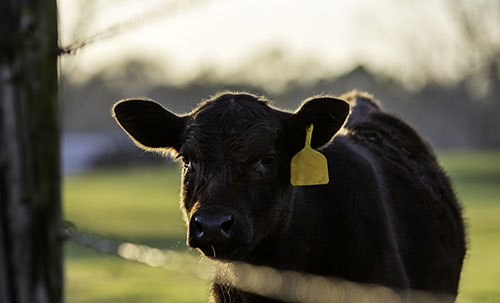Protect long-term herd profitability
Oct 25, 2021

While it is an often overlooked issue, beef producers need to be observant for cattle infections such as beef heifer mastitis in their herd. Infections not only impact current cattle productivity, but they can also impact the long-term herd profitability.
Infections in beef heifers can lead to lower cow conception rates during the narrow windows of time available to conceive. In fact, studies have confirmed that cows with mastitis can take up to 25% longer to conceive. In addition to lower cow conception rates, teat and udder infections cause scar tissue and severely limit milk production and impact calf weaning weights. Without maximizing the useful life of a cow, operations may have to invest in costly replacement heifers sooner.
Horn flies have been linked to the spread of bacteria among cattle, including Staphylococcus aureus, which causes mastitis. Given the role flies play in cow health and conception, implementing proper practices and preventative fly control strategies is key to protecting your herd and profit from horn flies.
Understanding effective horn fly control begins with understanding the pest’s life cycle. Female horn flies move from animal-to-animal feeding on the blood vessels in the skin of the teat, causing irritation and spreading disease. Eventually, female horn flies leave the animals to lay their eggs in fresh manure. Disrupting this life cycle is an essential component to controlling horn flies.
Altosid® IGR is a feed-through fly control solution that passes through the digestive system and works in cattle manure where horn flies lay their eggs, limiting future populations from emerging. The active ingredient in Altosid® IGR mimics naturally occurring insect biochemicals that are responsible for insect development. For greatest effectiveness, Altosid® IGR should be used as the foundation of an integrated pest management (IPM) program including proper sanitation, maintaining physical structures, incorporating naturally occurring fly enemies and using chemical controls.
Still have questions about Altosid® IGR? Stop by your local Co-op or reach out to your local animal health specialist!
For more content like this, check out the latest issue of the Cooperator.
Infections in beef heifers can lead to lower cow conception rates during the narrow windows of time available to conceive. In fact, studies have confirmed that cows with mastitis can take up to 25% longer to conceive. In addition to lower cow conception rates, teat and udder infections cause scar tissue and severely limit milk production and impact calf weaning weights. Without maximizing the useful life of a cow, operations may have to invest in costly replacement heifers sooner.
Horn flies have been linked to the spread of bacteria among cattle, including Staphylococcus aureus, which causes mastitis. Given the role flies play in cow health and conception, implementing proper practices and preventative fly control strategies is key to protecting your herd and profit from horn flies.
Understanding effective horn fly control begins with understanding the pest’s life cycle. Female horn flies move from animal-to-animal feeding on the blood vessels in the skin of the teat, causing irritation and spreading disease. Eventually, female horn flies leave the animals to lay their eggs in fresh manure. Disrupting this life cycle is an essential component to controlling horn flies.
Altosid® IGR is a feed-through fly control solution that passes through the digestive system and works in cattle manure where horn flies lay their eggs, limiting future populations from emerging. The active ingredient in Altosid® IGR mimics naturally occurring insect biochemicals that are responsible for insect development. For greatest effectiveness, Altosid® IGR should be used as the foundation of an integrated pest management (IPM) program including proper sanitation, maintaining physical structures, incorporating naturally occurring fly enemies and using chemical controls.
Still have questions about Altosid® IGR? Stop by your local Co-op or reach out to your local animal health specialist!
For more content like this, check out the latest issue of the Cooperator.